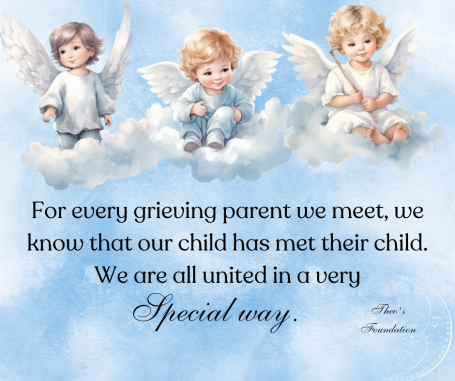
When we found out that our little Son-shine Theo had died we were visited by a bereavement midwife, after leaving the hospital that support went entirely! Family and friends supported us in the best way they could but the reality was and still is nobody would ever understand how we were feeling. Every individual grieves in their own way.
The lack of advice on where to turn didn't help us and in our very early days of grief there was no way we could have gone looking for it. Which is why you will find a There For You Section, with helplines, Support Networks, Books and Podcasts - or download our free Guide Navigating Through the Ocean of Grief so that you have a copy to hand as and when you need it.
We would have like to have attended a support group if we knew of any local to us but on the other hand, we would have wanted to help others first. So we decided to simply help and support each other. We also felt very unsupported by the professionals and if any support was given by others outside of the hospital it was aimed predominantly at us as Theo's parents. We knew that his Nanny and Aunty were also grieving and yet no support was offered to them, yet we knew how desperately this was needed. Baby and infant loss affects the whole family. The grief and feeling of loss impacts each person in a completely different way.
Our pain and devastation continues day after day. Not a day goes by where we don’t cry and feel very lost. In our experience you find as the weeks and months pass, less and less people ask if you are okay, ask if you need anything, and very often forget to even ask about our son. No parent wants their child forgotten.
We know how it felt not to have the support that we so desperately needed. Someone to talk to who had even just a little understanding. Through our journey we want to support other people whether it be Parents, Grandparents, Siblings, Aunts and Uncles who simply need someone to talk to or someone who will listen and have some understanding of the pain that they are enduring.
Should you require any support or just someone to talk to please contact us by email in the first instance or via our social media platforms.
You are not alone - together we are united.
What to Say...
Knowing what to say to someone who is grieving is often something we hear people struggle with. Many of our bereaved families have told us they're frequently told that people don't know what to say to them after loss, that those individuals then go on to not say anything at all, and very rarely checking in! Our bereaved families have expressed that often, this includes people they once thought closest to them including close family and friends.
We have spoken with families that have voiced that in the very early days of their grief that people were quick to get in contact and send their condolences, and would say "we are there for you" however, as time went on those people weren't there at all. This then leads to the feeling of grief to feel much deeper and darker, because although you have already experienced tremendous loss, you also feel like you are losing those that you once thought closest to you - enhancing the feeling of being lost and alone. Many people grieving will experience anger, although this is not always the case. Sometimes they may feel very frustrated and just need to rant about things, this isn't personal it's just a way of releasing the intense emotions.
When asking families what they would want people to say, many did not know what would be of help or have said that they just needed to know that people were there - not just by saying they are there but by showing it. Many families have also expressed that they did not need or want someone to be with them constantly as this could feel noisy and overwhelming, but just to know that someone would be about regularly. Many families have also said they did not necessarily need people to speak about what was going on, but even just talk about simple every day things. This isn't always helpful as some people feel consumed by their loss and it's all they wish to speak about, and need to get things out of their head and into the world. When talking to someone who is grieving just try to listen, advice isn't usually what they are wanting, they just need to get their feelings out, this could be spoken or ranting or showing their emotions by crying. Try to be led by them, if they wish to talk about their feelings they will, others might not and that is okay too. Just being there for them will mean so much to them, even if they aren't in a position of showing you appreciation for it right now.
"When someone has died everyone seems to reach out in the first few days or weeks but after the funeral they back away... but in truth it is when they were needed most" are comments we hear all too often. The trouble is, because the feelings of grief are different depending on who it is, for example an elderly relative - some people assume it is a part of life or to be expected and therefore feel that after the funeral the healing begins. However, there is no timeframe for healing, and many feel that healing isn't what happens especially when losing a child, that instead of healing you learn (somehow) to keep going in honour of your child.
In addition to this, more often than not when a child has died, there are investigations, post mortems, inquests and cases to be answered to. These can take many years of desperate struggle for families to receive any answers, or in cases where it is required, any justice. For some, these answers and justice never comes. This means, long after the initial grief there are many other immense struggles that arise and families face a daily uphill battle, not just with their grief but with learning how to survive these relentless and tremendous battles. The feeling of being alone, and not listened to is then heightened by people closest to them backing away. In addition to this many families have expressed that they have received little, (if any in some cases) professional support. This support is vital to anyone experiencing loss, but especially those affected by baby or child loss.
A lot of bereaved families have also noticed no one seems to ask about their child as they would have done if that child had survived. Often the child is not mentioned for fear of upsetting the family. This can be even more distressing for families, because their child exists, they are still parents/grandparents/aunties and uncles and parents long to speak about that child even if it causes them great pain in doing so. No parent wants to feel as though their child didn't exist, has been forgotten or that their child doesn't matter - because they do very much!
Sometimes even just visiting a grieving person and sitting in silence is all they need. It breaks up the day, it means they are not alone with their thoughts and spiralling into each wave of grief that at times can seem almost tidal. It can distract their minds from the pain even if just for a very short while, and at the very least they have some comfort knowing that someone is there with them in their deepest darkest of times and do not feel so alone.
We have put together a very short video on words to say to Bereaved families. Although these were written with people who have experienced the heart-break of baby and child loss in mind, they can apply to anyone who is grieving. Of course, there are many examples on how you could reword any number of things but these are just a few examples to help you know what to say to someone who is experiencing tremendous grief.
Thank you for watching, and if you have found this useful please share for others to have access to.
We would also like to thank Ullie Kaye Poetry for the inspiration in creating this guide and recommend their page for more of her beautiful poems.
As always, if you need any support please feel free to reach out using the link below the video, our Social Media Platforms or via our Contact form.
We need your consent to load the translations
We use a third-party service to translate the website content that may collect data about your activity. Please review the details in the privacy policy and accept the service to view the translations.




